Fumita Rolls Into Greco 60kg Final; Korea, Iran Put 3 Each Into Gold-Medal Matches
Wednesday, February 19, 2020 - 10:36 By Ken Marantz

NEW DELHI (Feb. 19)---World champion Kenichiro FUMITA (JPN) went with what works best to earn a shot at regaining his Asian title, while Korea had a productive day in putting three wrestlers into the five Greco-Roman finals on the second day of the Asian Championships.
Iran also has three finalists, while Kyrgyzstan, Uzbekistan and Kazakhstan have one each as the Greco-Roman competition will wrap up in the night session Wednesday at New Delhi’s K.D. Jahrav Wrestling Stadium.
Fumita, who added the 2019 world title in Nur-Sultan to the one he won two years earlier in Paris, chalked up a pair of 9-0 technical falls to advance to the 60kg final, where he will face Zholaman SHARSHENBEKOV (KGZ).
In the semifinals, Fumita handily ousted defending champion Islomjon BAKHRAMOV (UZB). Last year in Xi’an, China, Bakhramov won the gold when Fumita, who had trouble making weight, lost in the semifinals and had to settle for a bronze.
As he did in his opening match Wednesday against Gyanender GYANENDER (IND)—a fellow bronze medalist in 2019—Fumita used a high body lock in the par terre position to score numerous times with a simple tilt or a roll through.
Against Gyanender, Fumita pulled off the move four times to end the match in 1:38, but could only manage three times against Bakhramov. Fumita concluded the latter match with a flair, executing an arm throw that ended with Bakhramov on top of the Japanese, who only had to buck him off outside the circle for a forceout point at 3:23. An unsuccessful challenge resulted in the final 9-0 score.
“That’s my specialty,” Fumita said of the high-body lock. “I did it at the World Championships and it worked well. Nobody comes at my in the standing position, so I want to show, hey let’s take it to the ground. If they don’t want to go to the ground, they come at me at standing and I can try my throws.”
Fumita said he started his weight reduction earlier for this year’s tournament and it went well. “I think I can wrestle at my usual level,” he said.
The Japanese star also said he didn’t regard Bakhramov any differently because the Uzbeki had won the gold last year. “I wasn’t thinking about that,” he said. “But I’ve known him for a long time. I’m glad I was able to solidly win.”
Sharshenbekov, the 2018 world and Asian silver medalist at 55kg, advanced with a 9-2 win over Mehdi MOHSEN NEJAD (IRI). He survived a scare in the qualification round, when he needed a spin-behind takedown with :14 left to beat Aidos SULTANGALI (KAZ) 7-6.
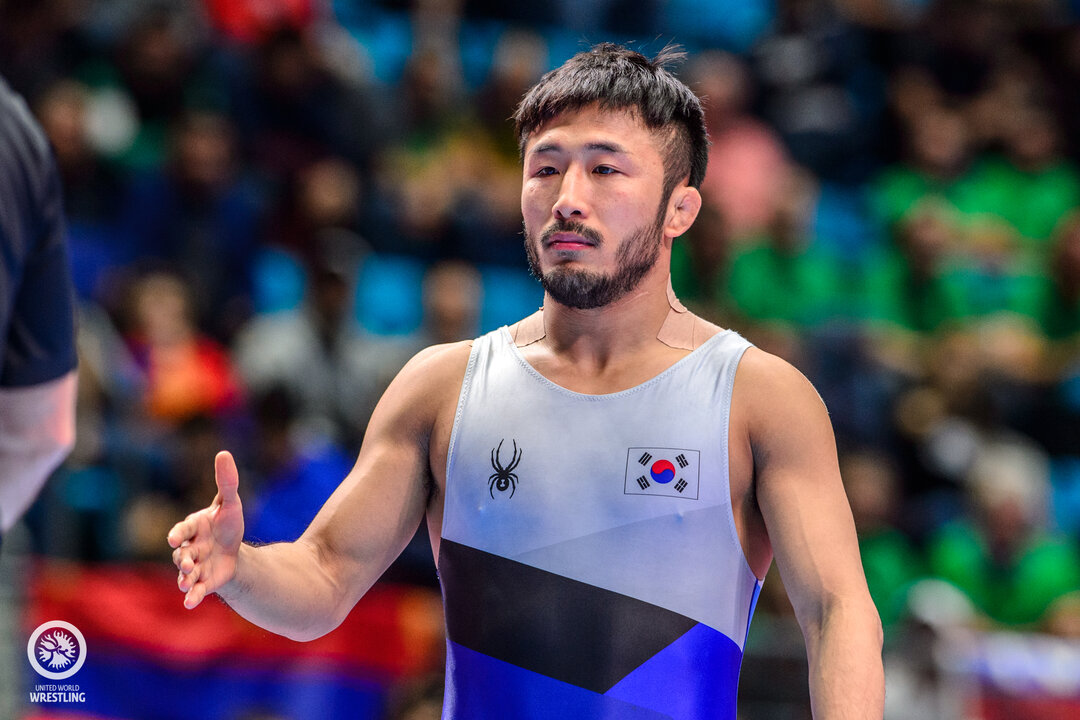 RYU Hansu (KOR) will wrestle Makhmud BAKHSHILLOEV (UZB) in the 67kg finals for a chance at retaining his Asian crown. (Photo: Tony Rotundo)
RYU Hansu (KOR) will wrestle Makhmud BAKHSHILLOEV (UZB) in the 67kg finals for a chance at retaining his Asian crown. (Photo: Tony Rotundo)
In other action, former world champion RYU Hansu (KOR) will get a chance to defend his Asian title at 67kg when he joined the Korean parade into the finals by beating Hossein ASSADI KOLMATI (IRI) 5-1 in the semifinals.
Ryu took a 1-0 lead into the second period when, gaining a passivity point and put on top in the par terre, he rolled the Iranian, then added an arm-drag takedown to clinch the match.
In the final, Ryu will face Matteo Pellicone ranking series event winner Makhmud BAKHSHILLOEV (UZB), who eked out a 4-4 win on criteria over Ashu ASHU (IND).
The other two finals involving Koreans will see them into head-to-head clashes with Iranians.
At 82kg, which has just seven entries and used the preliminary group system, CHOI Junhyeong (KOR) will face 2018 world U-23 bronze medalist Mahdi EBRAHIMI (IRI), having beaten current world U-23 bronze medalist Yevgeniy POLIVADOV (KAZ), 3-0 in the semifinals.
Ebrahimi pulled off a mild upset when he held on for a 6-5 victory over Jalgasbay BERDIMURATOV (UZB), a world bronze medalist at 77kg who was competing at the higher weight.
The 97kg final will be clash between LEE Seyeol (KOR) and Mohammadhadi SARAVI (IRI). Lee topped Muhammadali SHAMSIDDINOV (UZB) 3-1, while Saravi pinned Beksultan MAKHMUDOV (KGZ) in 1:42.
Korean Greco coach JUNG Jihyun chalked up the team’s success to a number of factors.
“There is a big competition coming up, and some nations didn’t participate in this tournament, so that’s why we did well,” he said, referring to the Asian Olympic qualifying tournament to be held next month and withdrawals here by China and two other countries due to circumstances related to the new coronavirus.
“And in Korea, we practiced very hard and it was also a reason for our good results today.”
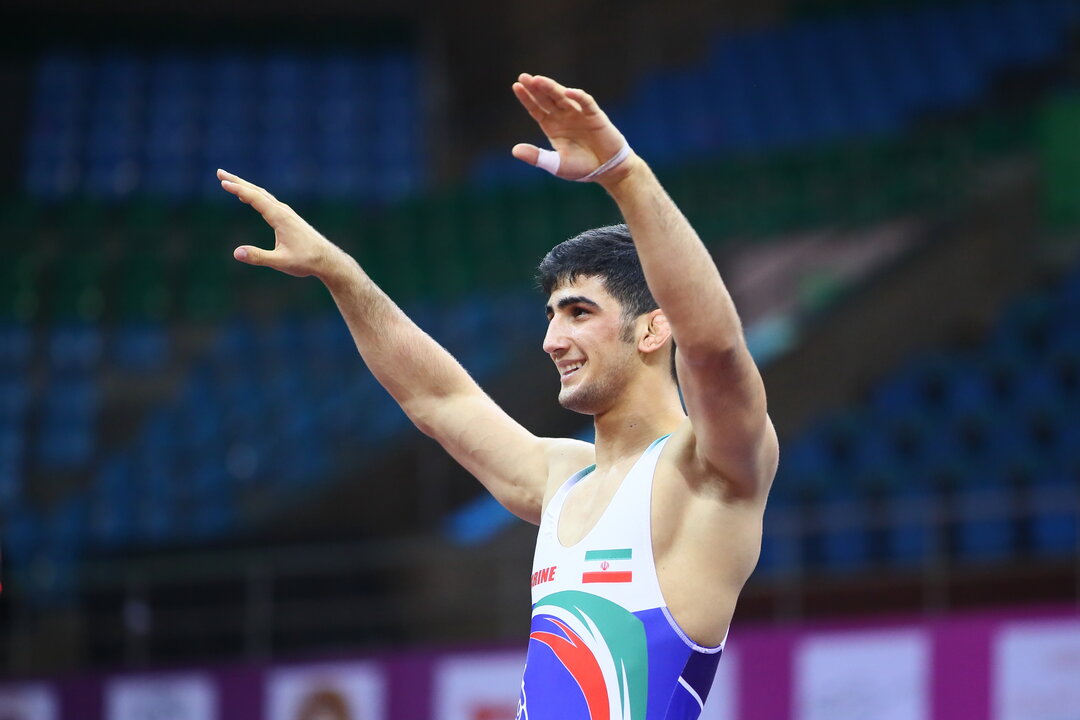 Almin KAVIYANINEJAD (IRI) will square off against Ibragim MAGOMADOV (KAZ) in the 72kg gold-medal match. (Photo: Sachiko Hotaka)
Almin KAVIYANINEJAD (IRI) will square off against Ibragim MAGOMADOV (KAZ) in the 72kg gold-medal match. (Photo: Sachiko Hotaka)
At 72kg, Almin KAVIYANINEJAD (IRI) edged 2019 bronze medalist Ruslan TSAREV (KGZ) 3-0 to set up a final with Ibragim MAGOMADOV (KAZ), who ended local hopes for a gold by beating Aditya KUNDU (IND) by 9-0 technical fall.
Day 2 results
Greco-Roman
60kg (10 entries)
SEMIFINAL – Kenichiro FUMITA (JPN) df. Islomjon BAKHRAMOV (UZB) by TF, 9-0, 3:23
SEMIFINAL – Zholaman SHARSHENBEKOV (KGZ) df. Mehdi MOHSEN NEJAD (IRI), 9-2
67kg (11 entries)
SEMIFINAL – Makhmud BAKHSHILLOEV (UZB) df. Ashu ASHU (IND), 4-4
SEMIFINAL – RYU Hansu (KOR) df. Hossein ASSADI KOLMATI (IRI), 5-1
72kg (9 entries)
SEMIFINAL – Almin KAVIYANINEJAD (IRI) df. Ruslan TSAREV (KGZ), 3-0
SEMIFINAL – Ibragim MAGOMADOV (KAZ) df. Aditya KUNDU (IND) by TF, 9-0, 1:48
82kg (7 entries)
SEMIFINAL – Mahdi EBRAHIMI (IRI) df. Jalgasbay BERDIMURATOV (UZB), 6-5
SEMIFINAL – CHOI Junhyeong (KOR) df. Yevgeniy POLIVADOV (KAZ), 3-0
97kg (10 entries)
SEMIFINAL – LEE Seyeol (KOR) df. Muhammadali SHAMSIDDINOV (UZB), 3-1
SEMIFINAL – Mohammadhadi SARAVI (IRI) df. Beksultan MAKHMUDOV (KGZ) by Fall, 1:42 (5-0)

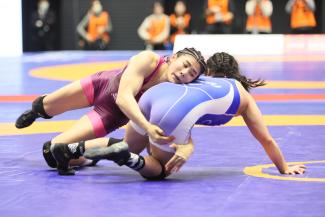
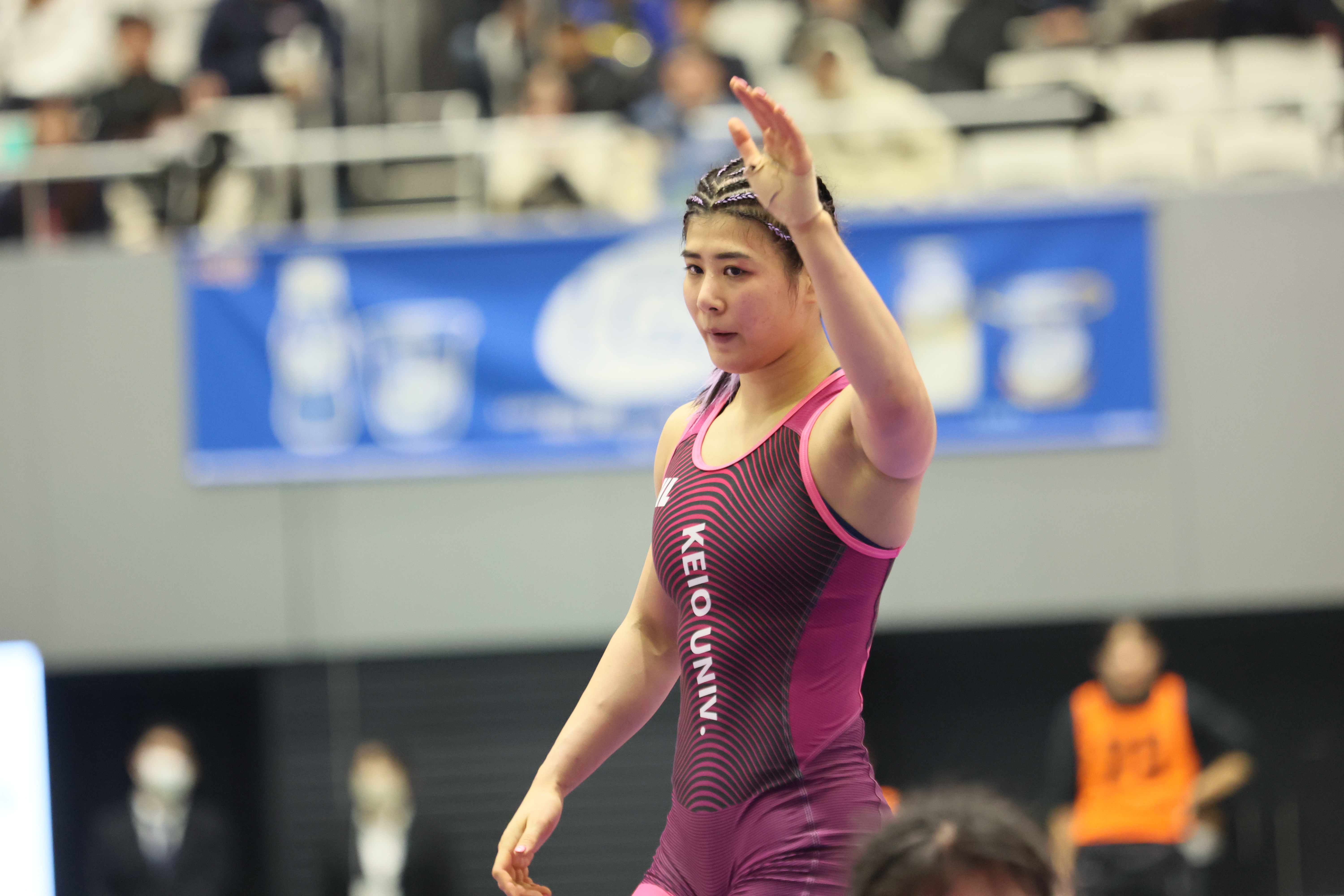 Nonoka OZAKI will wrestle Sakura MOTOKI in the 62kg final. (Photo: Takeo Yabuki / wrestling-spirits.jp)
Nonoka OZAKI will wrestle Sakura MOTOKI in the 62kg final. (Photo: Takeo Yabuki / wrestling-spirits.jp)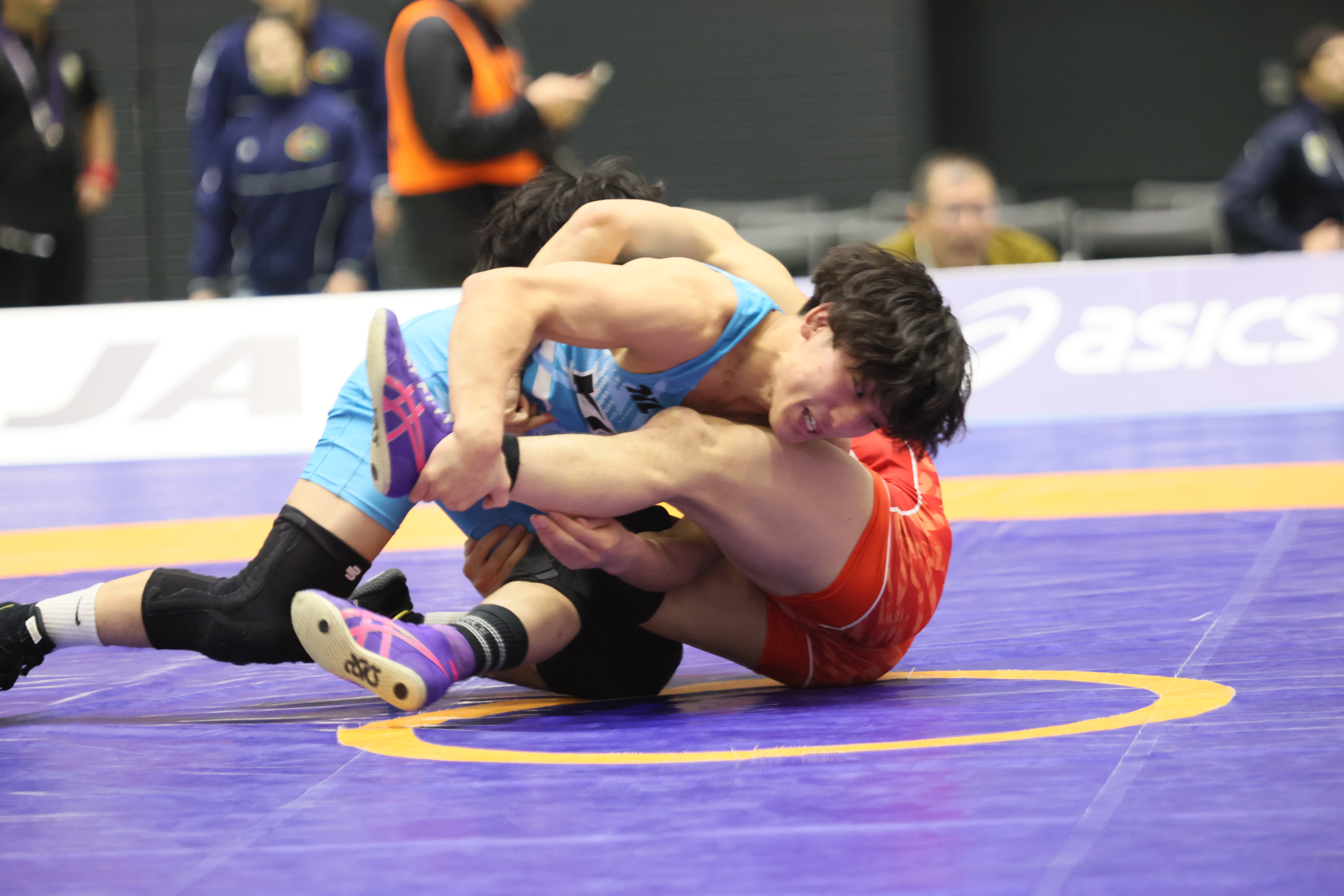 Takara SUDA, left, works for a takedown in the first period against Kaisei TANABE during their 65kg semifinal. (Photo: Takeo Yabuki / wrestling-spirits.jp)
Takara SUDA, left, works for a takedown in the first period against Kaisei TANABE during their 65kg semifinal. (Photo: Takeo Yabuki / wrestling-spirits.jp)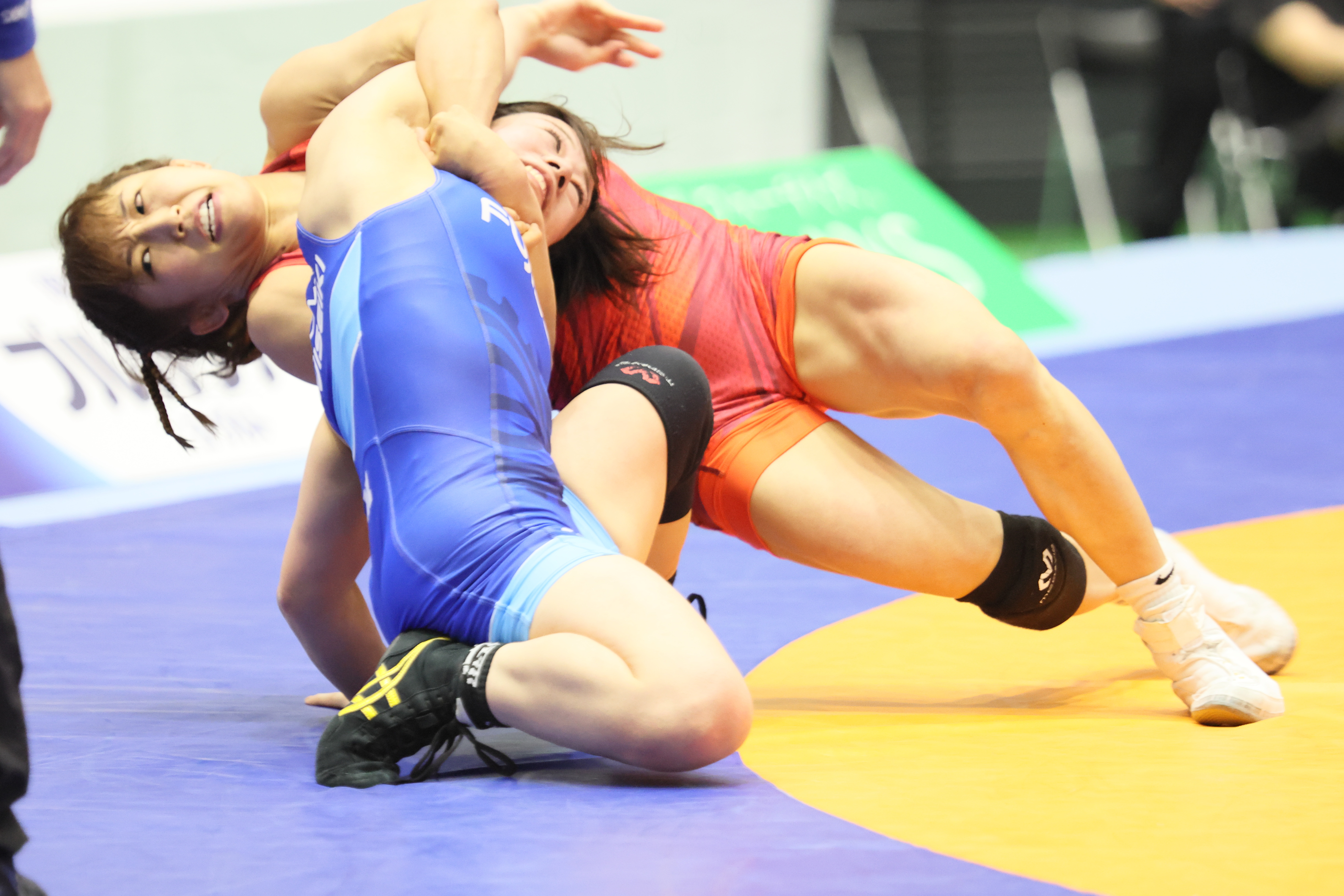 Yui SUSAKI throws Mako ONO en route to a technical fall in their 50kg semifinal. (Photo: Takeo Yabuki / wrestling-spirits.jp)
Yui SUSAKI throws Mako ONO en route to a technical fall in their 50kg semifinal. (Photo: Takeo Yabuki / wrestling-spirits.jp)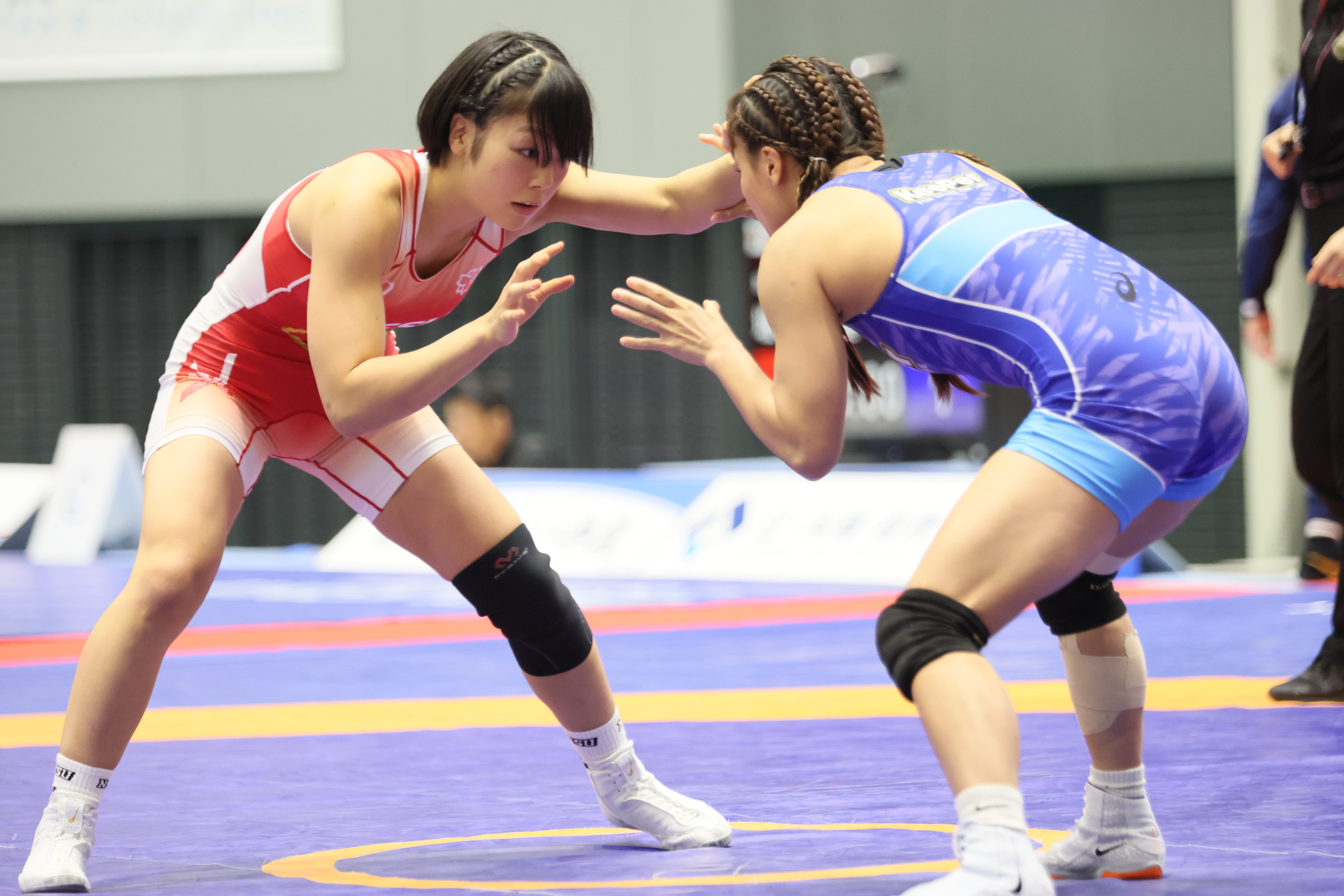 Akari FUJINAMI, left, squares off with Sara NATAMI in the 57kg semifinals. (Photo: Takeo Yabuki / wrestling-spirits.jp)
Akari FUJINAMI, left, squares off with Sara NATAMI in the 57kg semifinals. (Photo: Takeo Yabuki / wrestling-spirits.jp)
Share your thoughts.
Comments